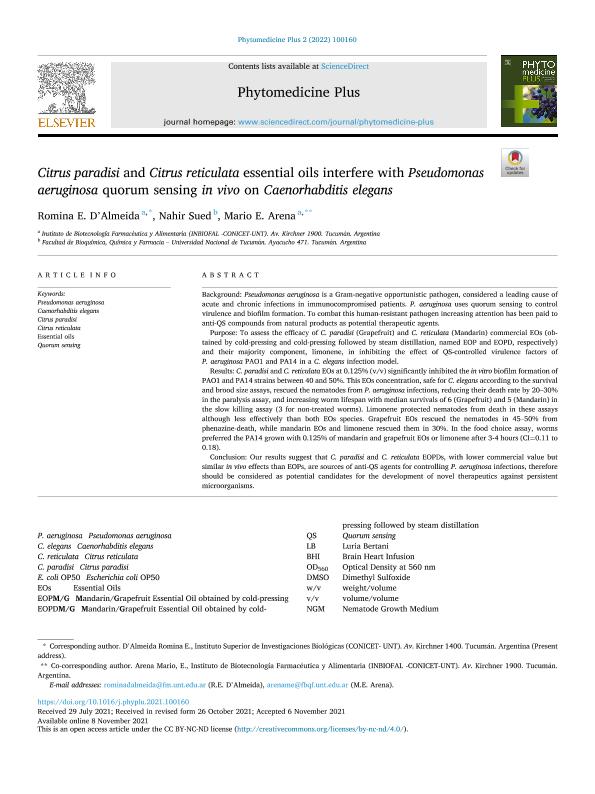Artículo
Citrus paradisi and Citrus reticulata essential oils interfere with Pseudomonas aeruginosa quorum sensing in vivo on Caenorhabditis elegans
Fecha de publicación:
02/2022
Editorial:
Elsevier
Revista:
Phytomedicine Plus
ISSN:
2667-0313
Idioma:
Inglés
Tipo de recurso:
Artículo publicado
Clasificación temática:
Resumen
Background: Pseudomonas aeruginosa is a Gram-negative opportunistic pathogen, considered a leading cause of acute and chronic infections in immunocompromised patients. P. aeruginosa uses quorum sensing to control virulence and biofilm formation. To combat this human-resistant pathogen increasing attention has been paid to anti-QS compounds from natural products as potential therapeutic agents. Purpose: To assess the efficacy of C. paradisi (Grapefruit) and C. reticulata (Mandarin) commercial EOs (obtained by cold-pressing and cold-pressing followed by steam distillation, named EOP and EOPD, respectively) and their majority component, limonene, in inhibiting the effect of QS-controlled virulence factors of P. aeruginosa PAO1 and PA14 in a C. elegans infection model. Results: C. paradisi and C. reticulata EOs at 0.125% (v/v) significantly inhibited the in vitro biofilm formation of PAO1 and PA14 strains between 40 and 50%. This EOs concentration, safe for C. elegans according to the survival and brood size assays, rescued the nematodes from P. aeruginosa infections, reducing their death rate by 20–30% in the paralysis assay, and increasing worm lifespan with median survivals of 6 (Grapefruit) and 5 (Mandarin) in the slow killing assay (3 for non-treated worms). Limonene protected nematodes from death in these assays although less effectively than both EOs species. Grapefruit EOs rescued the nematodes in 45–50% from phenazine-death, while mandarin EOs and limonene rescued them in 30%. In the food choice assay, worms preferred the PA14 grown with 0.125% of mandarin and grapefruit EOs or limonene after 3-4 hours (CI=0.11 to 0.18). Conclusion: Our results suggest that C. paradisi and C. reticulata EOPDs, with lower commercial value but similar in vivo effects than EOPs, are sources of anti-QS agents for controlling P. aeruginosa infections, therefore should be considered as potential candidates for the development of novel therapeutics against persistent microorganisms.
Archivos asociados
Licencia
Identificadores
Colecciones
Articulos(INBIOFAL)
Articulos de INSTITUTO DE BIOTECNOLOGÍA FARMACEUTICA Y ALIMENTARIA
Articulos de INSTITUTO DE BIOTECNOLOGÍA FARMACEUTICA Y ALIMENTARIA
Articulos(INSIBIO)
Articulos de INST.SUP.DE INVEST.BIOLOGICAS
Articulos de INST.SUP.DE INVEST.BIOLOGICAS
Citación
D'almeida, Romina Elisa; Sued, Nahir; Arena, Mario Eduardo; Citrus paradisi and Citrus reticulata essential oils interfere with Pseudomonas aeruginosa quorum sensing in vivo on Caenorhabditis elegans; Elsevier; Phytomedicine Plus; 2; 1; 2-2022; 1-7
Compartir
Altmétricas




